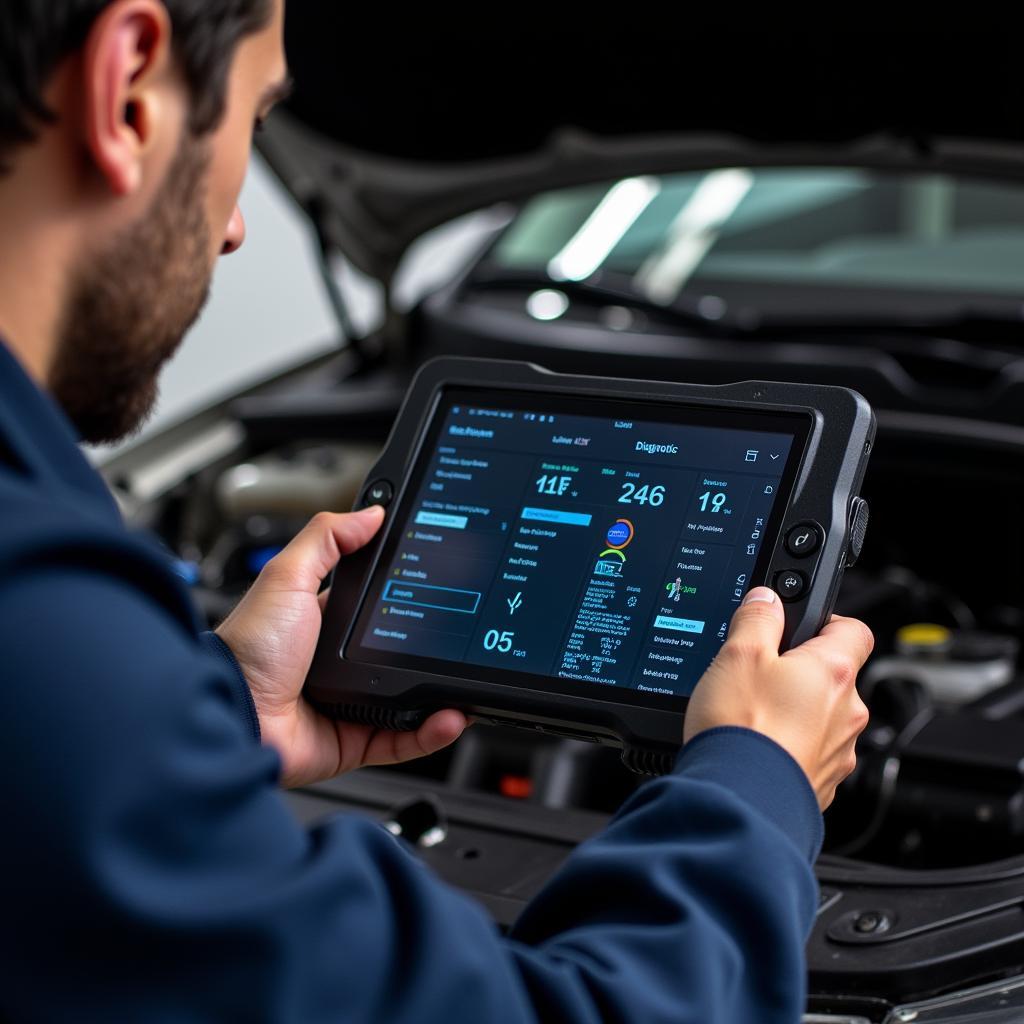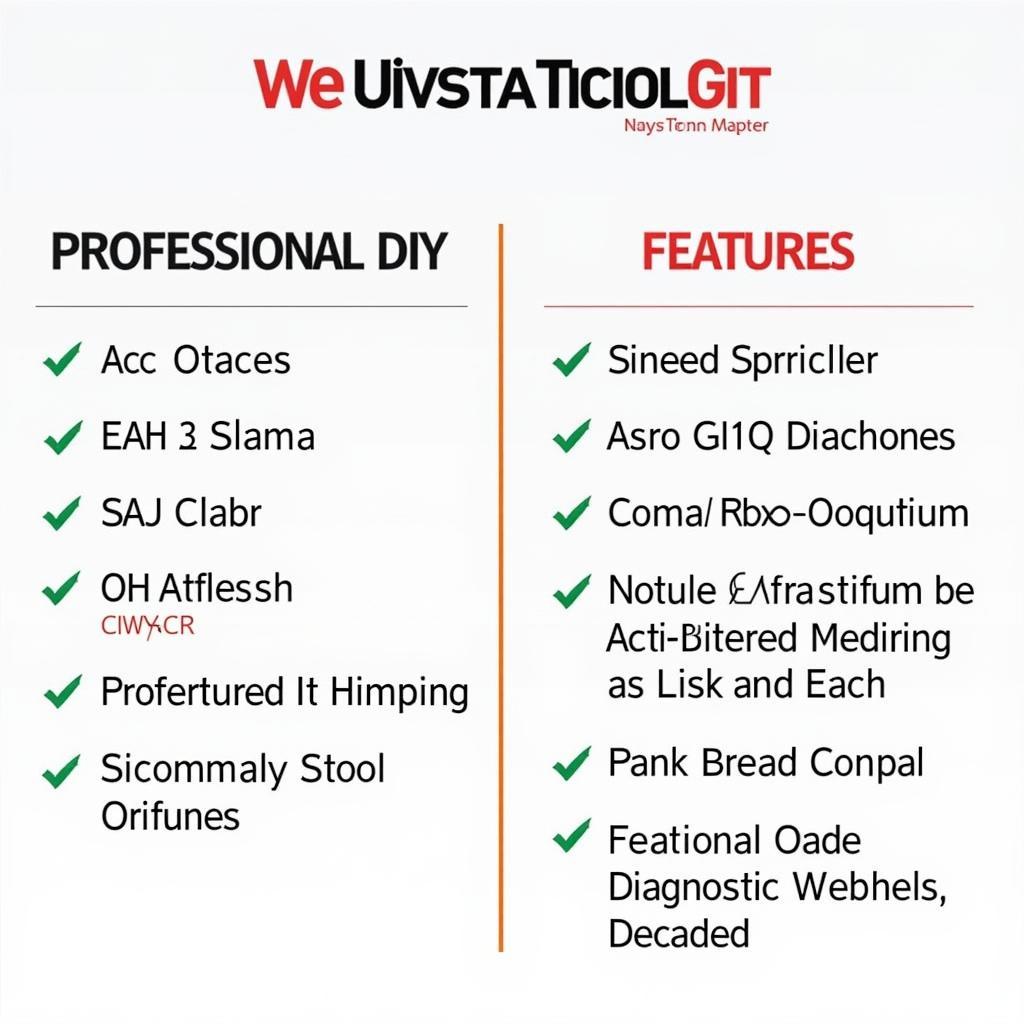A car diagnostics test is a vital procedure in modern automotive repair and maintenance. It involves using a specialized electronic tool, called a car diagnostic scanner, to communicate with your car’s computer system and retrieve valuable data about its health. This data can reveal potential issues, improve performance, and even prevent costly breakdowns down the road.
Unveiling the Mysteries: How Car Diagnostics Tests Work
Imagine your car is trying to tell you something’s wrong, but it doesn’t speak your language. That’s where car diagnostic tests come in. They act as translators, deciphering the complex codes and data stored within your vehicle’s computer system, also known as the Engine Control Unit (ECU).
The process is relatively straightforward:
- Connecting the Scanner: A mechanic connects a car diagnostic scanner to your vehicle’s OBD-II port, usually located under the dashboard on the driver’s side.
- Retrieving Data: The scanner communicates with the ECU, extracting information about various systems, including the engine, transmission, brakes, emissions, and more.
- Analyzing the Results: The mechanic interprets the data displayed on the scanner, identifying any error codes, performance issues, or potential problems.
 Mechanic Analyzing Diagnostic Results
Mechanic Analyzing Diagnostic Results
What a Car Diagnostics Test Can Tell You
A what is a diagnostics test on cars can reveal a plethora of information about your car’s health, including:
- Engine Performance: Identify issues related to fuel efficiency, ignition timing, air-fuel mixture, and more.
- Transmission Problems: Detect problems with gear shifting, clutch engagement, and other transmission components.
- Brake System Faults: Diagnose issues with ABS, traction control, and other brake-related systems.
- Emissions Control: Identify problems with the catalytic converter, oxygen sensors, and other emission-related components.
- Electrical System Malfunctions: Detect faults in the battery, alternator, starter, and other electrical components.
Why Car Diagnostics Tests are Essential
Gone are the days of relying solely on a mechanic’s intuition to pinpoint car problems. Car diagnostic tests have revolutionized automotive repair and maintenance, offering numerous benefits:
- Accurate Diagnosis: Precisely identify the root cause of car problems, eliminating guesswork and unnecessary repairs.
- Early Detection: Uncover potential issues before they escalate into major (and expensive) breakdowns.
- Improved Performance: Optimize engine performance, fuel efficiency, and overall vehicle responsiveness.
- Reduced Repair Costs: Avoid unnecessary repairs and replacements by addressing issues promptly.
Types of Car Diagnostics Tests
While the basic principle remains the same, there are different types of car diagnostics tests, each offering varying levels of depth and detail:
- Basic Code Reading: Retrieves and displays basic error codes, providing a general indication of potential issues.
- Enhanced Diagnostics: Provides more detailed information about specific systems and components.
- Manufacturer-Specific Diagnostics: Offers in-depth analysis and troubleshooting for specific car makes and models.
DIY vs. Professional Diagnostics
While affordable DIY car diagnostic scanners are available, consulting a qualified mechanic is generally recommended for accurate diagnosis and repair. Professional mechanics possess the expertise, experience, and advanced tools to interpret complex data and address issues effectively.
 Car Diagnostic Tools Comparison
Car Diagnostic Tools Comparison
“Investing in a professional car diagnostics test is like giving your car a thorough health check-up,” says automotive expert John Smith. “It’s a proactive approach to car maintenance that can save you time, money, and headaches in the long run.”
Choosing the Right Diagnostic Tool
If you’re considering a DIY approach to car diagnostics, selecting the right diagnostic tool is crucial. Factors to consider include:
- Vehicle Compatibility: Ensure the tool is compatible with your car’s make, model, and year.
- Features and Capabilities: Determine the level of detail and functionality you require.
- User Friendliness: Opt for a tool with an intuitive interface and easy-to-understand data display.
- Price and Value: Balance your budget with the features and capabilities offered by different tools.
You can find more information about choosing the right car diagnostic tool on our what is a good car diagnostic tool page.
The Future of Car Diagnostics
As technology advances, car diagnostics are becoming increasingly sophisticated. The future holds exciting possibilities, including:
- Predictive Diagnostics: Anticipating potential problems before they even arise, enabling proactive maintenance.
- Remote Diagnostics: Allowing mechanics to access and diagnose vehicles remotely, providing greater convenience and efficiency.
- Cloud-Based Data Sharing: Facilitating data sharing between mechanics, manufacturers, and car owners for improved diagnostics and repair.
Conclusion
Car diagnostic tests have become an indispensable part of modern automotive care. By providing valuable insights into your car’s health, they empower car owners and mechanics to make informed decisions about repair and maintenance. Whether you’re experiencing car troubles or simply want to ensure your vehicle’s optimal performance, a car diagnostics test is an investment worth considering. If you’re looking for a reliable and affordable car diagnostic test, be sure to check out our article on how much is a car diagnostics test.
FAQs about Car Diagnostics Tests
1. How often should I get a car diagnostics test?
It’s generally recommended to get a car diagnostics test annually or whenever you experience unusual car behavior.
2. Can a car diagnostics test drain my car battery?
No, car diagnostics tests consume minimal battery power and are unlikely to drain your car battery.
3. Can I drive my car with a check engine light on?
While it’s possible to drive with a check engine light on, it’s crucial to get your car diagnosed as soon as possible to avoid potential damage.
4. Will a car diagnostics test void my car warranty?
No, getting a car diagnostics test will not void your car warranty. In fact, regular maintenance, including diagnostics, can help preserve your warranty.
5. Can I reset the check engine light myself after a diagnostics test?
While it’s possible to reset the check engine light yourself, it’s generally not recommended unless you’ve addressed the underlying issue.
Need help choosing the right car diagnostic tool for your needs? We have a detailed guide on which diagnostic tool for my car to help you make an informed decision.
Have more questions about car diagnostics tests? Our team of car experts is here to help! Contact us via WhatsApp at +1(641)206-8880 or email us at [email protected]. We offer 24/7 support to address all your car diagnostic needs.

Leave a Reply